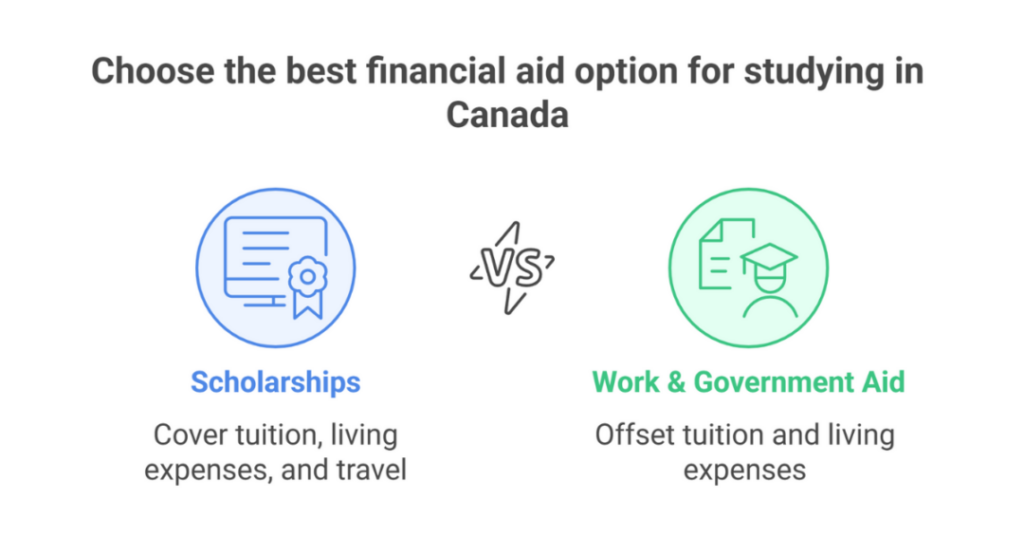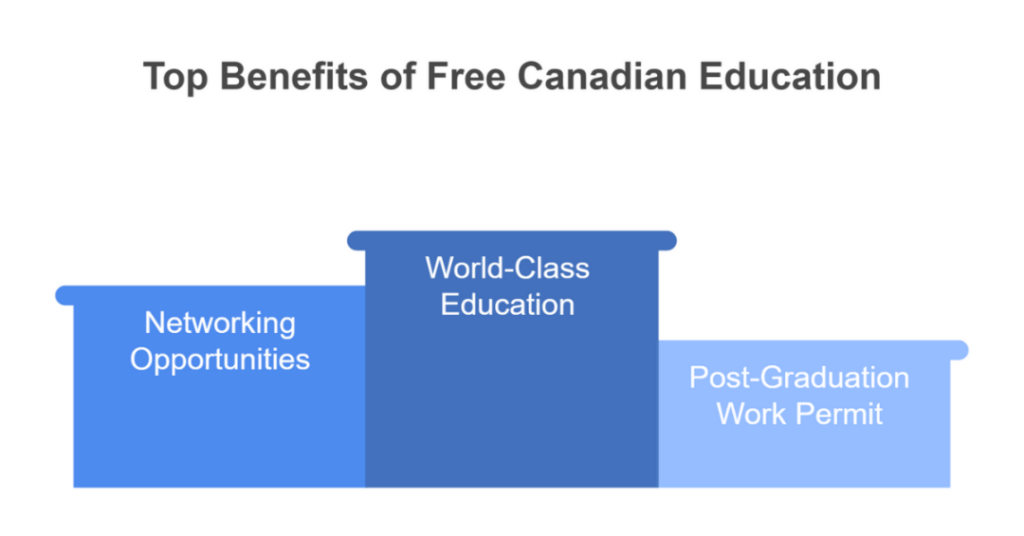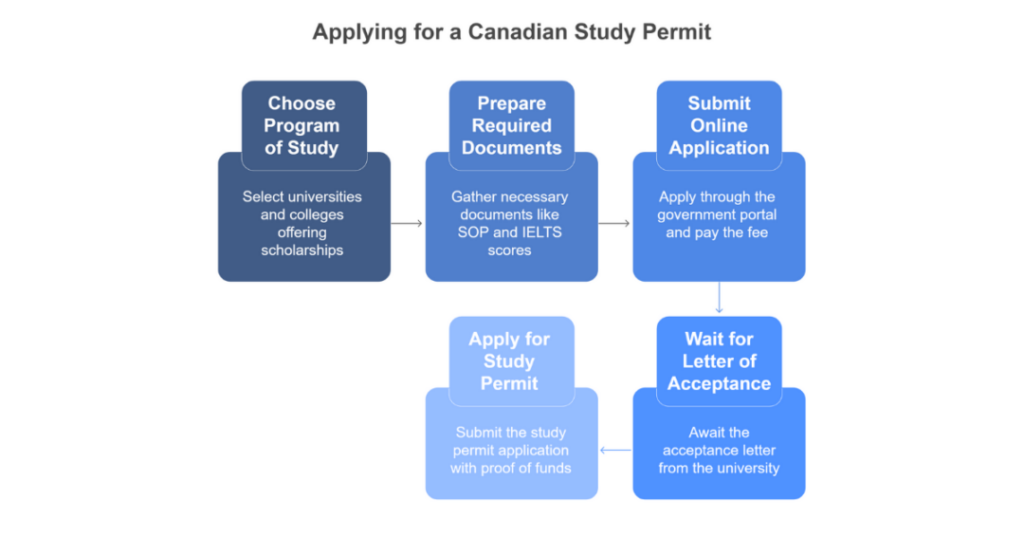18 June 2025
6 minutes read
How to Study in Canada Without Money as an Indian and International Student in 2025

Key Takeaways
- How to study in Canada without money includes applying for scholarships, tuition waivers, and financial aid from top Canadian universities.
- How to study in Canada without money also means working part-time legally while pursuing world-class education with minimal living expenses.
- How to study in Canada without money is possible by combining government support, academic excellence, and early student permit applications.
Imagine this: top-notch education, cosmopolitan cities, a passport to job opportunities, and all that without sucking the life out of your savings. Too good to be true? For several Indian and international students, Canada has made that a reality.
As it is now easier for international students to study in Canada, many are finding means to study in Canada for free on scholarships, government grants, and affordable programs. As tuition prices rise across the world, Canada presents a strong option that balances quality and price.
Canadian institutions, ranging from community colleges to universities such as the University of Manitoba, are making themselves more accessible to international top performers as well as students from all over the world.
With a good plan to study, a good application, and some research, it is possible to study abroad without money. This article discusses all you need to know about how students can study for free in Canada, from scholarships, cost of living to visa requirements, and how to get a permit to study.
How to Study in Canada for Free as an International Student in 2025?
Fun fact: Over 640,000 international students currently live and study in Canada—many of them on full or partial scholarships!

If you’re looking to study in Canada for free in 2025, here are your best bets:
- Apply for Scholarships in Canada: Canadian universities and colleges offer scholarships that cover tuition fees, expenses of living, and sometimes even travel costs. These include Vanier Canada Graduate Scholarships, Lester B. Pearson International Scholarships, and University of Manitoba Graduate Fellowships.
- Government of Canada Financial Aid: Students from impoverished or war-torn countries may qualify for Canadian government financial support through programs like the Canadian Commonwealth Scholarship.
- Work Part-Time While Studying: International students are allowed to work up to 20 hours per week during semesters and full-time during breaks. This helps offset tuition and living expenses.
- Study at Tuition-Free Institutions: Certain community colleges and public universities across Canada offer free education or minimal tuition fees for academically outstanding international students.
- Apply for On-Campus Jobs or Assistantships: These offer a stipend and sometimes cover full international tuition fees, making your education nearly free.
Is Studying in Canada Without Money and Studying on a Scholarship the Same?
Fun fact: Not all “free education in Canada” opportunities are scholarships. Some include assistantships, government grants, or programs from universities across Canada.
Here are key distinctions:
- Scholarships are merit- or need-based and are offered by universities and colleges in Canada or external bodies.
- Studying without money can also involve part-time jobs, study aid, tuition waivers, or on-campus employment.
- Scholarship in Canada typically requires a strong academic profile, statement of purpose, and letters of recommendation.
- Studying without money may also include work experience, resume submissions, and eligibility for programs that support international students from impoverished or war-torn nations.
- International students can study tuition-free by combining these methods smartly.
Comparison Table:
| Criteria | Scholarship | Studying Without Money |
|---|---|---|
| Funding Source | University, government, or private bodies | Work, study aid, tuition waivers |
| Application Requirements | High grades, SOP, LOR, IELTS/TOEFL, resume | Proof of low income, part-time work |
| Coverage | Tuition fee, living expenses, books | May partially cover tuition/living costs |
| Availability | Limited, competitive | Broader, more flexible |
| Example | Vanier Scholarship, U of T scholarships | On-campus jobs, assistantships |
What are the Advantages of Studying at the Top Universities and Colleges in Canada for Free?
Fun fact: Canada hosts 3 universities in the world’s top 100, all of which offer scholarships to students.
If you’re lucky enough to snag a scholarship or study for free, here’s what you stand to gain:
- World-Class Education: Top institutions like University of Toronto, McGill, and University of British Columbia deliver globally recognized degrees.
- Networking Opportunities: Free education often comes with mentorship, seminars, and exclusive research projects.
- Post-Graduation Work Permit: Allows you to work in Canada after your studies, giving you a pathway to permanent residence.
- Financial Relief: Eliminates the burden of student loans and high tuition and living expenses.
- Academic Recognition: Being an international student in Canada on scholarship boosts your profile globally.

Comparison Table: Free Education vs. Paid Education
| Factor | Free Education | Paid Education |
| Tuition Fees | Covered by aid | Paid by student |
| Access to Opportunities | High (mentorship, jobs, research) | Standard |
| Financial Stress | Low | High |
| Academic Pressure | High (to maintain) | Moderate |
| Career Outcomes | Often stronger with global exposure | Varies based on program and university |
Student Visa Application to Cost of Living in Canada: What Do You Need to Know About Studying Abroad?
Fun fact: A student permit is different from a student visa—and you might need both to travel to Canada!
Here’s what students need to keep in mind:
- Apply for a Study Permit: Required if your course and university you choose lasts over six months. Apply through the government of Canada portal.
- Visa vs. Study Permit: The visa allows entry into Canada; the permit allows you to stay and study.
- Cost of Living in Canada: Includes accommodation, groceries, transport, and healthcare. Budget around CAD 10,000 to 15,000 annually.
- Work Opportunities: International students are allowed to work part-time up to 20 hours per week.
- IELTS/TOEFL & Other Exams: Many universities require proof of English proficiency via IELTS or TOEFL. GRE, GMAT, ACT, or SAT may also be required depending on the study levels.
Summary Table
| Aspect | Details |
| Student Visa | Required to enter Canada |
| Education Permit | Required to study in Canada |
| Cost of Living | CAD 10,000 – 15,000 per year |
| Work Rights | 20 hours/week during term, full-time during breaks |
| Required Exams | IELTS, TOEFL, GRE, SAT, ACT, GMAT (varies by program of study) |
Top 15 Best Universities in Canada for International Students to Study for Free
Fun fact: Some Canada universities offer scholarships that cover tuition, accommodation, and even expenses of living!

These top institutions offer scholarships in Canada and study aid to help international students study in Canada for free:
| University Name | Popular Courses | Tuition Fee (With Aid) |
| University of Toronto | Engineering, Computer Science, Commerce | Free (with scholarship) |
| University of British Columbia | Life Sciences, Arts, Forestry | Free (with scholarship) |
| McGill University | Medicine, Law, Business | Free (with scholarship) |
| University of Manitoba | Agriculture, Science, Management | Low to Free |
| University of Alberta | Energy, Environmental Studies, Law | Free (with aid) |
| Simon Fraser University | Communication, Health Sciences | Low to Free |
| University of Ottawa | Public Policy, Linguistics, Law | Free (with scholarship) |
| Dalhousie University | Ocean Studies, Engineering | Low to Free |
| Queen’s University | Political Science, Finance | Free (with scholarship) |
| York University | Digital Media, Education | Low to Free |
| Concordia University | Engineering, Arts and Design | Low to Free |
| Laval University | Architecture, Literature | Free (in Quebec residents) |
| Carleton University | Journalism, Data Science | Low to Free |
| University of Calgary | Petroleum Engineering, Finance | Free (with scholarship) |
| Memorial University of Newfoundland | Marine Biology, Business | Free (with grants) |
How to Apply for a Study Permit to Canadian Universities?
Fun fact: The earlier you apply to study in Canada, the higher your chances of receiving scholarships and securing accommodation!
Here’s your guide to applying for a Canadian student permit:
- Choose Your Program of Study: Select universities and colleges offering scholarships that cover tuition.
- Prepare Required Documents: Statement of Purpose, Personal Statement, Resume, Letters of Recommendation, IELTS/TOEFL scores.
- Submit Online Application: Apply through the government of Canada portal and pay the application fee.
- Wait for the Letter of Acceptance: Needed to begin your study permit application.
- Apply for a Study Permit: After receiving your letter, submit your study permit application with proof of funds and identity.
Application Process Table
| Step | Details |
| Program Selection | Choose eligible Canadian universities and colleges |
| Documentation | SOP, LOR, Resume, IELTS/TOEFL, GRE/GMAT/SAT if applicable |
| Online Submission | Submit via Canadian government website |
| Acceptance Letter | Wait for and receive from chosen university in Canada |
| Study Permit Application | Submit full documentation and pay permit fees |
Conclusion
Studying in Canada without money in 2025 isn’t just a fantasy—it’s a highly achievable reality. With numerous scholarships, financial aid programs, tuition waivers, and part-time work opportunities, students from around the world can make their dream of studying in Canada come true.
By selecting the right course and university you choose, maintaining a strong academic profile, and applying strategically, you can unlock free education in Canada.
International students from impoverished or war-torn countries also have special opportunities through government of Canada support and global scholarship programs.
Whether your goal is to settle in Canada, work in Canada, or simply gain world-class education, this guide equips you with all you need to plan to study abroad.
From student permit applications to managing the cost of studying in Canada, every section above addresses what you need to know about studying and how to study in Canada without money.
Students can apply for scholarships, gain work experience, and receive financial support to make education in Canada for international students accessible and affordable.
So go ahead—apply to study in Canada with Ambitio, build your dream resume, and become one of the many international students who not only came to Canada but thrived across Canada. Remember, free tuition and a bright future are no longer opposites—Canada has made sure of that.
FAQs
How to study in Canada without money as an international student?
How to study in Canada without money as an international student involves applying for scholarships, seeking tuition waivers, and working part-time during your course.
How to study in Canada without money through scholarships?
How to study in Canada without money through scholarships includes applying for top programs like Vanier Canada Graduate Scholarships and the Lester B. Pearson Award.
How to study in Canada without money and still cover living expenses?
How to study in Canada without money and still cover living expenses is possible by combining scholarships, on-campus jobs, and working 20 hours per week legally.
How to study in Canada without money and meet English requirements?
How to study in Canada without money requires meeting English requirements by taking IELTS or TOEFL, which are often mandatory for admission and scholarships.
How to study in Canada without money using a student permit?
How to study in Canada without money using a student permit involves getting accepted to a program, submitting the required documents, and applying early to increase your chances.
How to study in Canada without money through community colleges?
How to study in Canada without money through community colleges is a smart choice, as many offer low-cost tuition, scholarships, and flexible work-study options.
How to study in Canada without money if you’re from a low-income background?
How to study in Canada without money if you’re from a low-income background is achievable with financial aid programs, government support, and tuition waivers.

You can study at top universities worldwide!
Get expert tips and tricks to get into top universities with a free expert session.
Book Your Free 30-Minute Session Now! Book a call now




























